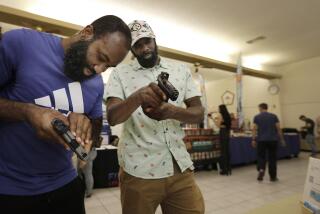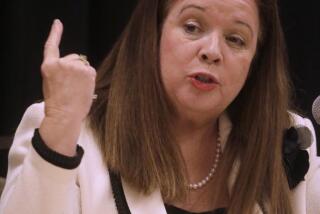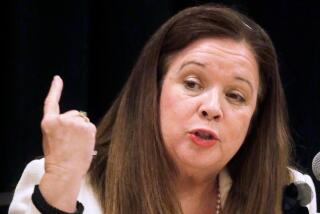Meese Hopes to Eliminate Evidence Exclusion Rule
- Share via
WASHINGTON — Atty. Gen. Edwin Meese III told prosecutors today that he hopes eventually “we can do away with” a rule that bars the use in court of illegally obtained evidence.
Meese said he has fought for nearly 25 years to abolish or relax the “exclusionary rule,” enunciated in a 1914 Supreme Court decision which interpreted the Constitution’s 4th Amendment prohibition against illegal search and seizure.
Appearing before a legislative conference of the National Assn. of District Attorneys, an organization representing 6,500 local prosecutors, Meese said he was heartened by the high court’s decision last July, which authorized “good-faith exceptions” to the rule.
In a 6-3 ruling, the court held that when judges or magistrates make mistakes that violate a defendant’s rights--and police reasonably rely on those court actions--the rule generally should not come into play.
That decision marked the first time the high court has narrowed the rule to permit exceptions based on the good faith of police officers who believed they did nothing wrong.
But it was limited to those occasions in which police take the time to get a court-authorized search or arrest warrant. When those warrants later prove to be defective, the court said, the evidence obtained by the police who used them will be allowed at trial.
Meese said he hopes district attorneys and prosecutors around the country will “make sure the good-faith exception is properly handled” so law enforcement authorities can demonstrate a case for abolishing the rule.
“Eventually, based on the record, hopefully we can do away with the rule,” the attorney general said.
Meese, a one-time deputy district attorney in Alameda County, Calif., said he wants to “erase, or at least minimize, the impact” of the rule.
The exclusionary rule, he maintained, “ . . . helps the guilty criminal, which is one of the tragedies . . . in our system of jurisprudence, where valid, probative evidence--the truth in other words--is excluded from a trial.”
More to Read
Sign up for Essential California
The most important California stories and recommendations in your inbox every morning.
You may occasionally receive promotional content from the Los Angeles Times.










